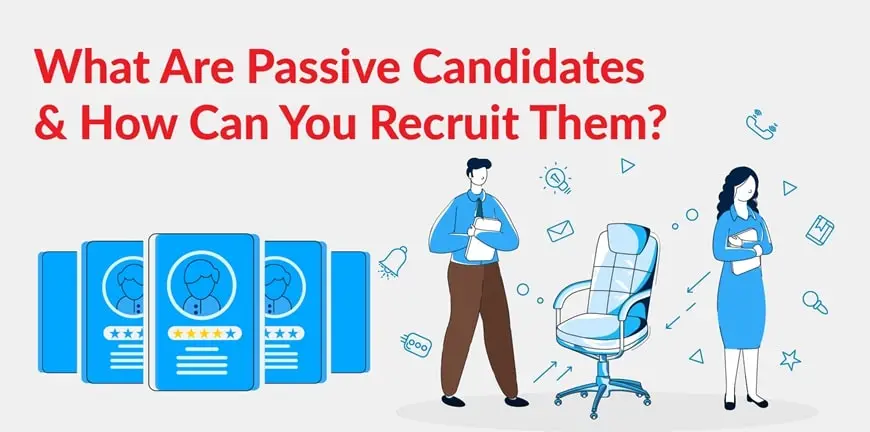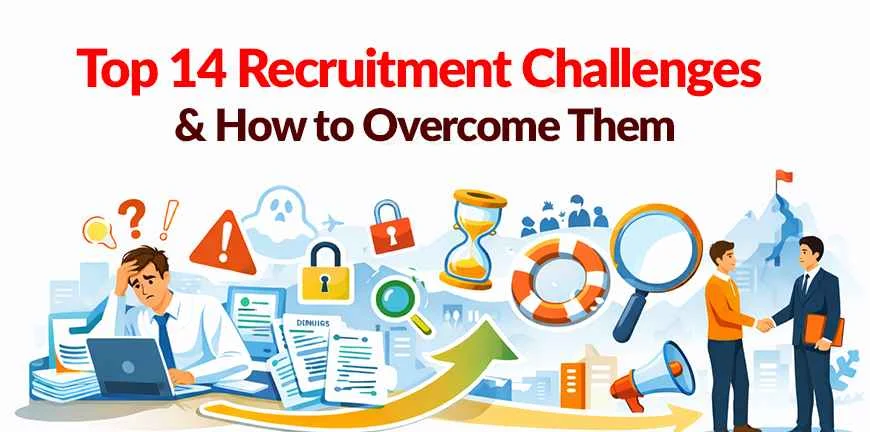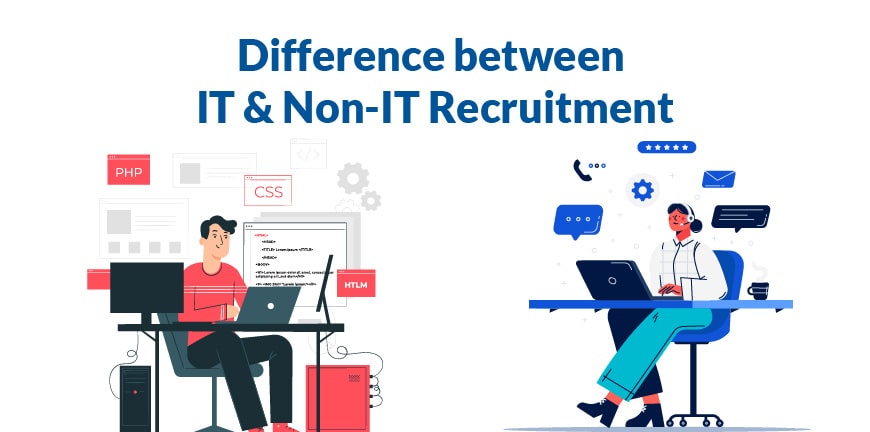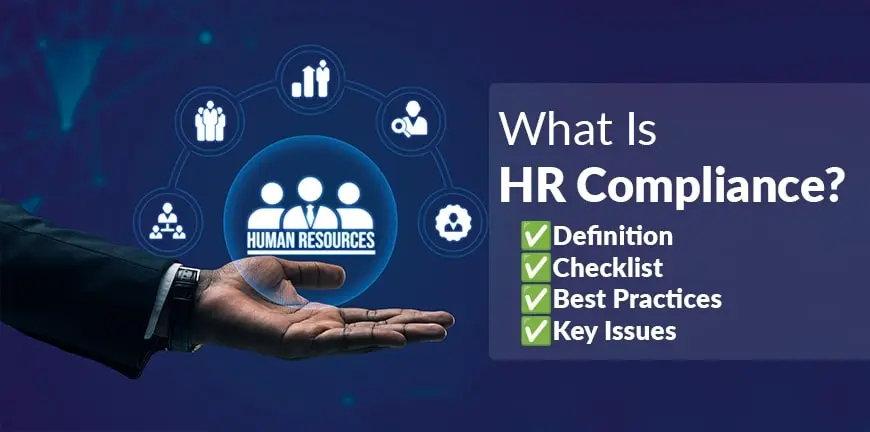
What is HR Compliance: A Practical Guide for 2026
17/04/2024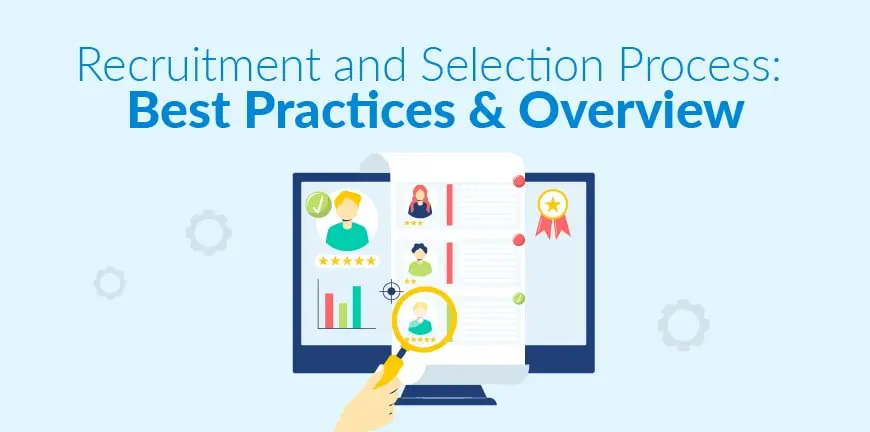
What is Recruitment and Selection Process in HRM? Benefits & Best Practices
24/04/2024- What Is a Passive Candidate?
- Passive vs. Active Candidates
- How to Reach Out to Passive Candidates?
- 5 Tips for Recruiting Passive Candidates
- What are the Benefits of Recruiting Passive Candidates?
- What are the Challenges of Recruiting Passive Candidates?
- Why Recruit Passive Candidates?
- Get Active with Your Passive Candidate Game
- Frequently Asked Questions
Recruiters have no shortage of options when it comes to hiring. You could shortlist profiles from active jobseekers or look at a promising profile from a passive candidate. Another option is to go in for outsourcing the recruitment process, either partially or fully (RPO) to an HR partner. But what if you already had a strong enough talent pipeline? Could you then not just look at it and get back to passive candidates? You could, and we think you should too! Let’s see why.
What Is a Passive Candidate?
A passive candidate is someone who has applied for a job earlier in your organization and was rejected or you have met at an event and was well qualified but is now actively employed elsewhere and could be interested in the job you have posted. The passive candidate would not have seen the job application you have posted and will not have any details about the vacancy. As a recruiter, you would need to contact the passive candidate directly and inform them of the job vacancy so you can secure their interest.
Passive vs. Active Candidates
When it comes to hiring a passive candidate, people make a lot of assumptions. The term itself seems a bit confusing for them. Let us now look at the differences between passive and active candidates to understand a passive candidate better:
| Passive | Active |
| Not actively looking for a job | Actively seeking a job |
| Employed and not serving notice period | Probably serving a notice period even if employed |
| Not aware of the job or role in question | Aware of the job or role as they would have seen the vacancy and applied for it |
| Would be in the talent pipeline | Very unlikely they would be
even in the talent pool |
| May not be subject to initial screening | Would be subject to initial screening rounds |
| Not under a new employee referral | May come through a new employee referral |
How to Reach Out to Passive Candidates?
Reaching out and engaging passive candidates requires some effort. You will have them somewhere in your talent pipeline as candidates who were qualified enough to make it through a few rounds, but you didn’t hire eventually.
You can contact them through their preferred mode of communication as mentioned by them in your last contact with them. You can also send a backup note on the mode of communication mentioned in their resume.
5 Tips for Recruiting Passive Candidates
1. Personalize your communications
Keep your messages concise and clear and personalize it for each candidate as you already know them well. Engage with your passive candidates regularly. And when there is an opportunity, inform them of it as early as possible.
2. Promote your employer brand
Your employer brand is what makes you stand out from the bunch, so make sure that you have a strong one. Be present, at exhibitions, webinars and with representatives at seminars.
3. Sell your value
Convince the passive candidate to engage with you by selling your value to them. What makes you different from other companies – is it the great work culture, the remuneration you offer, or the value that experience at your organization adds to their profile?
4. Be friendly and empathetic
Do not let the recruiter-recruit relationship stop you from talking to the person behind the applicant, understand the person’s worries and trepidations, so that the candidate become confident they can contribute to meet your goals.
5. Simplify candidate evaluation
If you think they are at the top of the game, acknowledge it openly by making the evaluation process simpler. Fewer screening rounds, voiding the psychometric analysis, all help in bringing a talented and gifted candidate on board.
What are the Benefits of Recruiting Passive Candidates?
1. Access to a larger talent pool
A larger talent pool is available on tap when one is looking to recruit passive candidates.
2. Diversity in hiring
You can bring in greater diversity among your employees in less time by looking into a talent pipeline and recruiting passive candidates.
3. Better ROI
The return on investment is higher with engaging and recruiting passive candidates as they are generally more qualified or may have better skills than active candidates.
4. Competitive advantage
There is a competitive advantage of hiring passive candidates. Studies show that passive candidates are 120% more likely to have a positive impact on your business.
5. Greater transparency
When recruiting passive candidates, there is greater transparency in the hiring process, because someone in the HR team is already introduced to the candidate at some point. and the candidate feels a bit more assured than otherwise.
What are the Challenges of Recruiting Passive Candidates?
1. Data may be outdated
The data on the passive candidate may be outdated, if it is a few years old, and you may need to once again get the updated data on them before you begin a conversation.
2. May not be interested
Interest levels may be low after a rejection or they may have developed a bias, even if the rejection was on valid grounds. You need to have a fair bit of empathetic and value-based talking to bring them back.
3. The market is very competitive, especially for senior roles
When hiring for more senior roles, the market is extremely competitive, which makes it difficult to meet the demands of the candidate.
4. Time to hire may increase
Time to hire may also increase, if the talent pipeline is weak and the candidates with the necessary skills are not there. Using recruitment software will help get over this problem easily.
5. Copy matters
When engaging with passive candidates, it is all about the conversation. If you use poor generic copy or are not empathetic or helpful in understanding their problem points, the likelihood of them working for you is very low.
Why Recruit Passive Candidates?
A passive candidate could be the saving grace for your company. Do not let them off your radar and ensure that you keep track of how they are progressing in their careers. If you recruit the right passive candidates, you can benefit by reducing the time to hire onboard people with the best of skills and probably even improve the diversity or the cultural outlook in the company.
Get Active with Your Passive Candidate Game
Passive candidates come with their own dictates and needs and their own impressions of your company. Selling them the honest version is the best way out. This is because, since they bring such benefits, you will be spending a lot of money to ensure that they stay on in the company. If you need help recruiting passive candidates, talk to Alp Consulting, an HR services company with more than two decades of experience in recruitment and staffing solutions. Help us help you!
Frequently Asked Questions
1. What is passive candidate recruiting?
Passive candidate recruiting involves hiring candidates who are not actively looking for a job. They may already be employed or unaware of the job requirement. Passive candidate recruiting is a job that will involve a lot of hard work and dedication and the right methods too.
2. How to find passive candidates?
Recruiters might find passive candidates in a talent pipeline they have created already using recruitment software or in previous email or other communication. They might need to recall the place and time of contact at times, if they have no record of the candidate maintained in a database, and this is especially for venues like exhibitions and seminars.
3. How to convince passive candidates?
Convincing passive candidates takes a lot of effort. It can be simplified if you have a stronger employer brand, build a better reputation online across social media channels and on your main website and have better conversations with the candidates who choose to work with you.
4. How to engage passive candidates?
Engaging passive candidates can be easier using the strategies mentioned earlier in this article. Some of them are simplifying your evaluation process, building a better brand and writing better copy and having better conversations. You must be honest with them and make the right promises.
5. Why are passive candidates better?
Passive candidates could be better than active candidates, as they may have more experience and generally greater clarity on what they want. They have also impressed you once, so there is a greater likelihood that this time they may be hired and perform better than other active jobseekers.
Contact Us For Business Enquiry

Amit Saproo
Amit Saproo is the Head of Operations at ALP Consulting with nearly 17 years of experience in Executive Search, RPO, Leadership, and IT & Engineering recruitment. He leads nationwide recruitment programs across Technology, BFSI, and R&D domains, driving strategic hiring solutions for diverse client needs. Amit excels in building and managing high-performance teams that deliver scalable, end-to-end recruitment and consulting services.

